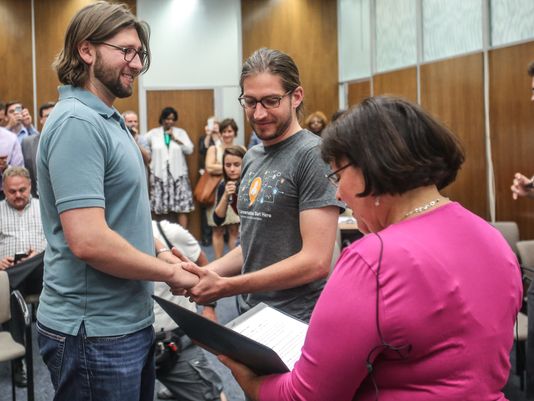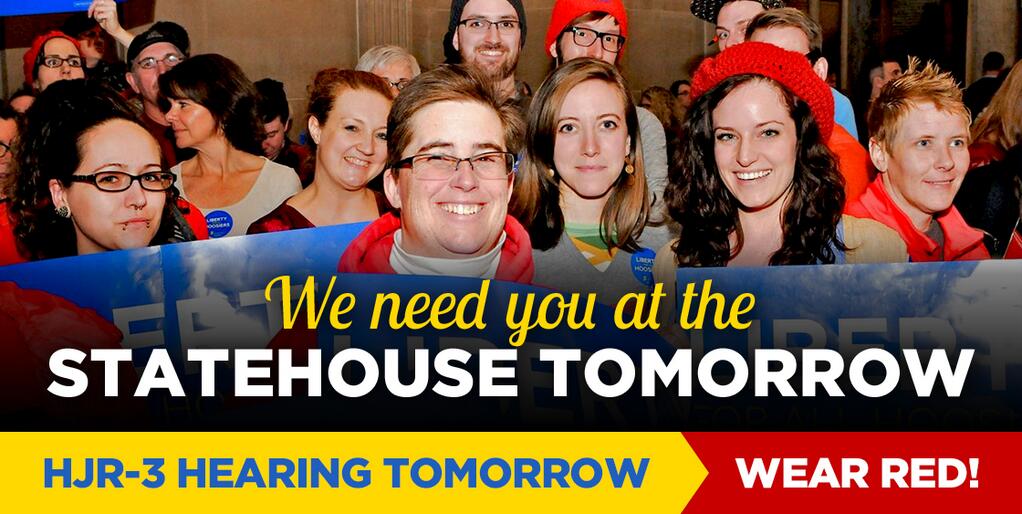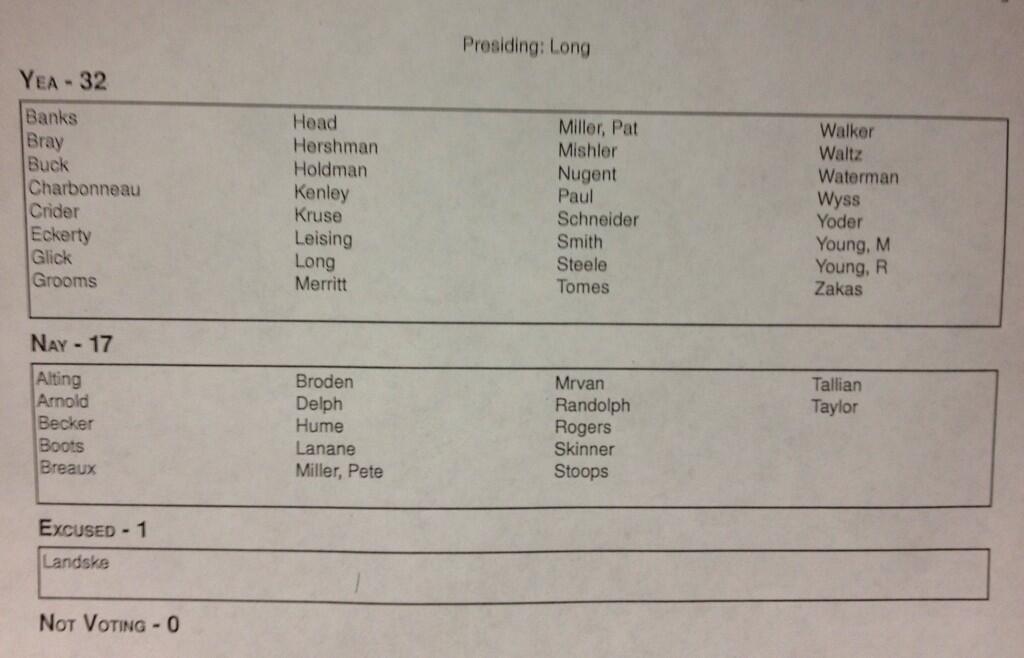Boxed In: Employment Of Behind-The-Scenes And On-Screen Women In 2013-14 Prime-Time Television
From the Center for the Study of Women in Television and Film: San Diego State University, the annual report on women in television
The report is available in a downloadable PDF file: Boxed In: Employment Of Behind-The-Scenes And On-Screen Women In 2013-14 Prime-Time Television
In 2013-14, women comprised 27% of creators, executive producers, producers, writers, directors, editors, and directors of photography working on prime-time programs airing on the broadcast networks. This represents a decrease of 1 percentage point from 2012-13. On screen, women accounted for 42% of all speaking characters, a decrease of 1 percentage point from 2012-13. This year’s study also reports the findings of an expanded sample including programs airing on the broadcast networks, on basic and paid cable channels, and available through Netflix.
Same-sex marriage is legal in Indiana

Yesterday, a federal court judge threw out Indiana’s ban on same-sex marriage, ruling that the Gay marriage ban violates Equal Protection Clause and Due Process Clause. See the the summary judgement here [pdf]. Because there was no stay on the ruling, Indiana couples could begin marrying immediately, and the Marion County Clerk’s office was prepared for the lines of same-sex couples who showed up to apply for a license.


219 marriage license were issue to same-sex couples in Marion County yesterday, and 150 ceremonies were performed in the Marion County Clerk’s Office. And the Clerk’s office is anticipating hundreds more marriages today.
Because Stephanie and I were married in 2008 and our marriage suddenly was valid in Indiana, we thought it would be fun to take flowers to all the folks waiting to get married yesterday. We handed out over 125 flowers to individuals inline – we ran out of the first 9 bouquets and then went to the florist to get more.
We saw tons of friends getting married yesterday – it was amazing. I’m still giddy.
County Clerks all over the state were issuing licenses and marriages, although there was some confusion and refusals by some counties to issue licenses. This map was accurate as of sometime yesterday evening. Late in the evening Indiana Attorney General Greg Zoeller issued a notice to all county clerks advising them to follow the ruling of the court.
Of course Zoeller waited to make that statement until well after he had filed an appeal for a stay on the federal court ruling.
2015-06-02 Recently Read
NY Times: Storme DeLarverie, Early Leader in the Gay Rights Movement, Dies at 93
“Nobody knows who threw the first punch, but it’s rumored that she did, and she said she did,” said Ms. Cannistraci, an owner of the Village lesbian bar Henrietta Hudson. “She told me she did.”
Ms. DeLarverie was a member of the Stonewall Veterans Association and a regular at the pride parade, but she rarely dwelled on her actions that night. Her role in the movement lasted long after 1969. For decades she was a self-appointed guardian of lesbians in the Village.
Tall, androgynous and armed — she held a state gun permit — Ms. DeLarverie roamed lower Seventh and Eighth Avenues and points between into her 80s, patrolling the sidewalks and checking in at lesbian bars. She was on the lookout for what she called “ugliness”: any form of intolerance, bullying or abuse of her “baby girls.”
Mother Jones: Fearing Rising Backlash, NRA Urges Gun Activists to Stand Down
It may be that a broader cultural shift—or at least a strategic one—is stirring within the gun lobby. In its statement on Friday, the NRA also cracked open the door to so-called “smart guns,” which aim to improve safety through innovative technological features. Historically the NRA has vigorously opposed them as yet another catalyst for dubious government overreach, but now says: “In principle, the idea would seem to have merit, at least in some circumstances.” That pivot comes not long after a businesswoman in California and a gun dealer in Maryland spoke out about harassment and death threats for trying to sell the cutting-edge weapons.
The NRA has also backtracked recently from its long-held stance against laws meant to disarm domestic abusers—a major factor in gun violence against women—by quietly supporting recent such legislation in states including Wisconsin and Minnesota.
Talking Points Memo: Why Is Capital So Much Stronger Than Labor?
Surely part of solving the inequality problem will require reducing the outsized political power of those with the most resources (and to be clear, I’m arguing that their usual dominance is highly amplified and uniquely unopposed in our current politics). If I’m right about the role of economics today in supporting capital and opposing labor, then part of winning that fight requires a new economics that encompasses a much broader scope of human and societal well-being, that more readily sees market failures, more accurately gauges and fairly judges reactions to policy changes, and places a much heavier weight on shared prosperity, and not solely through redistribution, but through market outcomes.
As another Thomas—Pynchon—said: “If they can get you asking the wrong questions, they don’t have to worry about answers.” Progressives have all kinds of ideas to shape a more equitable primary distribution. But those ideas will never get much oxygen if we remain voluntary trapped in the cramped debate of a short-sighted economics.
This is a lucky young man
Ryland has some awesome parents.
Powerful Essay on the World Trade Center Attacks
By Steve Kandell on Buzzfeed [The Worst Day Of My Life Is Now New York’s Hottest Tourist Attraction]:
The fact that everyone else here has VIP status grimly similar to mine is the lone saving grace; the prospect of experiencing this stroll down waking nightmare lane with tuned-out schoolkids or spectacle-seekers would be too much. There are FDNY T-shirts and search-and-rescue sweatshirts and no one quite makes eye contact with anyone else, and that’s just fine. I think now of every war memorial I ever yawned through on a class trip, how someone else’s past horror was my vacant diversion and maybe I learned something but I didn’t feel anything. Everyone should have a museum dedicated to the worst day of their life and be forced to attend it with a bunch of tourists from Denmark. Annotated divorce papers (find an adoption lawyers in case they have children) blown up and mounted, interactive exhibits detailing how your mom’s last round of chemo didn’t take, souvenir T-shirts emblazoned with your best friend’s last words before the car crash. And you should have to see for yourself how little your pain matters to a family of five who need to get some food before the kids melt down. Or maybe worse, watch it be co-opted by people who want, for whatever reason, to feel that connection so acutely.
What Girls Wear in Summer Time
From Role Reboot: A Message To Teenage Girls About Summer Dress Codes By Chelsea Cristene
The other day while driving home from work, I saw a shirtless man who looked about my age—mid 20′s—mowing his lawn. I did not roll down my window and cat call, or yell to him that I’d like a piece of that. I did not scoff in disgust, thinking that his lack of shirt was an invitation for me to comment on his appearance in a derogatory way or to view him as someone with no self-respect. He was a man mowing his lawn, sweating under the high afternoon sun, and dressed for the weather.
That is the difference.
We live in a culture that produces girls’ tops with narrower shoulder straps than boys’ tops, girls’ shorts that expose more leg than boys’ shorts, and then shames girls for wearing the clothes that are sold to them. We live in a culture that tells boys it’s OK to shed clothing in the heat in order to be more comfortable, but tells girls that their comfort is secondary to how others perceive them.
When people tell you these things, they are part of a larger system that often operates without their full knowledge. It is the same system that excuses assault if the victim was drinking or was not a virgin, and that tells women not to get raped instead of telling men not to rape. You are not a piece of uncovered meat, and you are not to blame when your fellow autonomous human beings choose not to exercise self-control. Your body and the clothes you put on it are not “things” “given” to others.
The difficulty is that this message is being sent to young women. It also needs to be sent to young men. The script needs to change. Tell young men it’s their responsibility to keep their hands to themselves, and that understanding the importance of clear verbal consent from young women is their responsibility and anything else is illegal and immoral.
Women have been spreading this message for years. When men finally get with the program and join them in spreading it, then young men’s behavior will change.
Essential Follow-up Reading on HJR-3
Indy Star — The intrigue behind the curtain cloaking the HJR-3 debate
“When the Indiana Senate cast its vote Monday on the proposed same-sex marriage ban, it all seemed pretty straightforward, even predictable. The vast majority of Republicans voted for the measure and it passed 32-17.
But outside public view, another story was playing out. In the days and hours leading up to the vote, a group of socially conservative senators was plotting in private to kill the marriage amendment.”
Commentary from inside the organization fighting HJR3 on this article: “I read it twice. A lot of it has an element of reality, some is off base. But we’ve got to be ready for 2015. No question.”
Digital Media News — Reporters Notebook: Indiana Senator’s Twitter War A Fascinating Read
“First, some disclosure. In Indiana State Senator Mike Delph’s world, I am a “liberal”. I am not a moderate, independent…nope…I am a “liberal” because I do not agree with his position regarding gay marriage. Second, Delph was punished, in part, for contents of a Twitter war that topped 250 tweets over two or three days best described as a melt-down over the demise of HJR-3 which was a constitutional amendment banning gay marriage in Indiana. Senate President Pro Tempore David Long has disciplined Delph — taking away leadership roles and even moving his seat — for violating Senate protocol when he tweeted about the same-sex marriage amendment. According to Long’s office, Delph used Twitter to report information, garnered from a GOP private caucus, on the fate of Senate action on House Joint Resolution 3.”
Zombie HJR-3: Out-of-state groups want to force HJR-3 onto 2014 ballot
According to RTV-6 News – Group may force HJR-3 on 2014 ballot:
Posted: 02/19/2014 Rafael Sanchez
INDIANAPOLIS – A national pro-marriage group is considering whether to take legal action to force HJR-3 on the Indiana ballot in November 2014.The measure came to a halt on Monday, when the Senate did not return the bill its original status, in which it would impact civil unions.
The National Organization for Marriage tells RTV6 that they met with the House Speaker Brian Bosma on Friday.
“We are building a coalition of the willing and looking for legislators who are willing to join in this task,” said Chris Plante, regional director of NOM.
“We understand it will be heavy lifting, but if we all work together, we believe we have the law on our side. And we believe HJR-3 should go to the people in November 2014 as was promised by legislature on multiple occasions,” said Plante.
Nevermind what Hoosiers want; out-of-state interests are weighing in on what should happen in Indiana, which is at odds with their “states should decide marriage” stance. But anti-gay groups have never been big on consistency.
The End of HJR-3 for 2014 (with some thoughts on HB-1153)
Because in the past, I’ve been terrible about writing down the follow-up of the Indiana Marriage Discrimination Amendment, here’s a wrap-up post in case this comes up again in two years – HJR-3 passed through the state legislature, but we essentially “won” because we succeeded in keeping it off the ballot in 2014.
After my January 24th post, the amendment moved to the floor of the House of Representatives on January 27th. Stephanie and I attended the hearing at the Statehouse for that event, where they opted to remove the second sentence of the bill:
“A legal status identical or substantially similar to that of marriage for unmarried individuals shall not be valid or recognized.”
The amendment now reads only “Only a marriage between one (1) man and one (1) woman shall be valid or recognized as a marriage in Indiana.”
This is significant because the second sentence had significant problems of interpretation that made it possible to discriminate against anything that resembled a domestic partnership, and threatened things like powers of attorney, living wills and directives, the ability to visit a same-sex partner in the hospital and other ramifications. Similar language in other states’s bills (Ohio, Kentucky) created problems for same-sex couples.
The companion bill – HB 1153, which was intended to “explain the legislative intent” of the second sentence died quietly in the House of Reps because it was no longer relevant. Did I ever post the content of HB-1153? I don’t recall. But here it is, and it reads as a roster of why the second sentence was a problem:
House Bill 1153
House Bill (H)
Authored by: Rep. P Eric TurnerIntroduced Version
HOUSE BILL No. 1153
_____
DIGEST OF INTRODUCED BILL
Citations Affected: IC 1-1-5.6.
Synopsis: Marriage amendment ballot language. Requires that the question of approval of the constitutional amendment concerning marriage proposed by the 117th general assembly be placed on the 2014 general election ballot if the amendment is agreed to by the 118th general assembly. Prescribes the ballot language for the question. Describes the legislative intent of offering the constitutional amendment.
Effective: Upon passage.Turner, Thompson
January 9, 2014, read first time and referred to Committee on Judiciary.HOUSE BILL No. 1153
A BILL FOR AN ACT to amend the Indiana Code concerning marriage.
Be it enacted by the General Assembly of the State of Indiana:SECTION 1. IC 1-1-5.6 IS ADDED TO THE INDIANA CODE AS A NEW CHAPTER TO READ AS FOLLOWS [EFFECTIVE UPON PASSAGE]:
Chapter 5.6. Marriage Amendment to the State Constitution
Sec. 1. As used in this chapter, “marriage amendment” refers to any amendment to Article 1 of the Constitution of the State of Indiana concerning marriage that was proposed by the one hundred seventeenth general assembly (P.L.231-2011) and agreed to by the one hundred eighteenth general assembly.Sec. 2. The general assembly intends and establishes that the purpose of the marriage amendment is to restrict the state, through legislative, executive, or judicial action, from creating or recognizing a legal status between unmarried individuals equivalent or substantially similar to marriage between one (1) man and one (1) woman. The first sentence of the marriage amendment prohibits the recognition of marriage between persons other than one (1) man and one (1) woman. The second sentence of the marriage amendment prohibits the state from circumventing the mandate of the first sentence by creating or recognizing a legal status equivalent or substantially similar to marriage by a different name.
Sec. 3. The general assembly intends and establishes that the marriage amendment does not prohibit or restrict in any way:
(1) the extension of employment benefits by private sector employers, political subdivisions of the state, or state educational institutions to any beneficiary designated by an employed individual;
(2) the adoption and enforcement of local ordinances granting to any category or class of persons equal opportunities for education, employment, access to public conveniences, access to accommodations, or acquisition of property or to rent property;
(3) an individual from entering into or enforcing terms of a power of attorney, a will, a trust, or another similar lawful agreement or instrument (regardless of name) established for the benefit of another person;
(4) an individual from giving or enforcing a lawful consent or other instrument (regardless of name) that grants powers, rights, or privileges to, imposes obligations on, or provides for the use by or transfer of property to another person;
(5) the protections provided under Indiana’s domestic violence laws or who may qualify for protection from domestic violence; or
(6) action by the general assembly to protect or provide for the property, health, or safety of unmarried persons by appropriate legislation.
SECTION 2. [EFFECTIVE UPON PASSAGE] (a) If the amendment to Article 1 of the Constitution of the State of Indiana concerning marriage proposed by the one hundred seventeenth general assembly (P.L.231-2011) is agreed to by the one hundred eighteenth general assembly, the amendment shall be submitted to the electors of the state at the 2014 general election in the manner provided for the submission of constitutional amendments under
IC 3.
(b) Under Article 16, Section 1 of the Constitution of the State of Indiana, which requires the general assembly to submit constitutional amendments to the electors at the next general election after the general assembly agrees to the amendment referred to it by the last previously elected general assembly, and in accordance with IC 3-10-3, the general assembly prescribes the form in which the public question concerning the ratification of this state constitutional amendment must appear on the 2014 general election ballot as follows:“PUBLIC QUESTION #1
Shall the Constitution of the State of Indiana be amended by adding the following language to Article 1:“Section 38. Only a marriage between one (1) man and one (1) woman shall be valid or recognized as a marriage in Indiana. A legal status identical or substantially similar to that of marriage for unmarried individuals shall not be valid or recognized.”?”.
(c) This SECTION expires July 1, 2017.
SECTION 3. An emergency is declared for this act.
HB-1153 came about to assuage the objections of many legal scholars who had studied the HJR-3 second sentence and its potential effects and pointed out unintended consequences that had already played out in other states with similar language, or that could be raised in Indiana.
The difficulty is that this bill had no teeth at all – it was a piece of legislation, but HJR-3 was an amendment to the Indiana constitution, where it held sway over this bill and potentially trumped it. HB-1153 could be repealed at any time, leaving the full force of the second sentence un-“interpreted” intact to be carried out.
I wonder how much of an impact reading this bill had, actually, on our state legislators. It surely indicated in plain language the many ways that HJR-3 could be interpreted negatively in ways that were punitive toward same-sex couples by our legal system, and spelling out potential discrimination based on HJR-3 that starkly is pretty damning. It may have been intended to remove the sting of HJR-3’s “second sentence” but I think it probably had the opposite effect in that it highlighted all that could go wrong.
After the second sentence of HJR-3 was removed from that bill in the House, HB-1153 was no longer relevant and passed into oblivion a few days later.
The removal of the second sentence in the House was very exciting because it meant that it would be much harder to to get the Indiana Marriage Discrimination Amendment onto the ballot this fall in time for 2014 elections. It would have to be put back into the bill by the Indiana Senate and then voted on by both the Senate and the House before voters could see it.
So the bill passed to the Indiana Senate Rules Committee on February 13th, where they declined to hear any amendments to add the second sentence back in.
There was great drama surrounding the Rules Committee hearing because the GOP caucus met ahead of the hearing, and Senator Mike Delph from Carmel tweeted the results of the caucus meeting – that there were not enough votes to put the second sentence back in – before the hearing happened, alerting the crowd to what was going to happen.
HJR3 second sentence is officially dead in the 2014 IGA. Not enough support to reinsert it on 2nd reading.
— Mike Delph (@MikeDelph) February 13, 2014
That didn’t sit well with Senator President Pro Tem David Long, the caucus head. It’s bad form for caucus members to reveal caucus business.
Then as the committee began to meet, they opened with an anti-gay prayer by William Hunt, New Life Church, invited by Senate chaplain.
#openingprayer at Ind Senate asks God to "convict" Senators into restoring "normative definitions". Not even trying 2 hide bias #HJR3
— Rob Pickett (@rcpickett72) February 13, 2014
The bill sailed through the committee as is, first sentence only, very quickly, although it was noted by many people that this was considered impossible even six months ago:
I can’t believe that just happened. No, really. Six months ago, impossible. #HJR3
— Jennifer Wagner (@JenniferAWagner) February 13, 2014
VICTORY: We just made history, and it's because of you. #HJR3 will NOT be on the ballot this year. Thank you Indiana! pic.twitter.com/nZH2pZfG6y
— Freedom Indiana (@freedom_indiana) February 13, 2014
Senator Mike Delph went on to spend the weekend tweeting his anger about the GOP caucus electing not to add the second sentence back into the bill, and delivering rather passionate lectures on god, same-sex marriage and the responsibilities of Indiana churches to back legislative efforts.
“@MikeDelph: And that folks is our self absorbed Godless culture that is fast tracking our nation to ruin. Point made. Night!” #stopHJR3
— Steph Mineart (@electrasteph) February 14, 2014
It was a very entertaining weekend, and I make sure to screen-cap all of it for posterity.
After that great drama, on Monday, January 17th, the Senate passing the amended version of HJR-3, still without the second sentence, through the full Senate.
This was the vote count:
The passage almost seemed anti-climatic, except for some really great speeches delivered by Senators on the floor – Jean Breaux, Karen Tallian, Jim Arnold, Tim Lanane, and Greg Taylor all spoke passionately against HJR-3. It was cathartic to hear them. At the end…
BREAKING: Senate passes amended version of #HJR3. The anti-freedom amendment is officially off the ballot in 2014! pic.twitter.com/3B8EF0WuCp
— Freedom Indiana (@freedom_indiana) February 17, 2014
Ultimately, HJR-3 isn’t dead. It still could be passed through another state legislature in 2015 or 2016 and be on the ballot in 2016. I’m not sure which version could or would be considered, so it’s worth keeping the text of HB-1153 around in order to remind people about that second sentence and what it could do.
It does seem a lot less likely that the amendment will pass in 2016 with several federal legal battles on the horizon, though.
Washington Post – Race on same-sex marriage cases runs through Virginia:
The Supreme Court’s ruling in United States v. Windsor is confronting judges with a paradox. On the one hand, the opinion written by Justice Anthony M. Kennedy and joined by the court’s four liberals noted that defining marriage is traditionally a power reserved for the states.
On the other, the opinion dismissed Congress’s arguments as to why the federal government should recognize only traditional definitions of marriage. It said the arguments were mostly window dressing for unlawful prejudice based on sexual orientation.
State courts and federal judges have embraced that latter reasoning to trump the rights of states, and bans on same-sex marriage have been found unconstitutional since June in New Jersey, New Mexico, Oklahoma and Utah. The Utah and Oklahoma decisions are being appealed to the U.S. Court of Appeals for the 10th Circuit, based in Denver.
In effect, said William Baude, a law professor at the University of Chicago who follows the issue, the majority’s language in Windsor has been viewed as “permission” for judges “who might already have been inclined” to believe there is a constitutional right to marry.
Given this, 2015 and 2016 are going to be really interesting years, politically.






